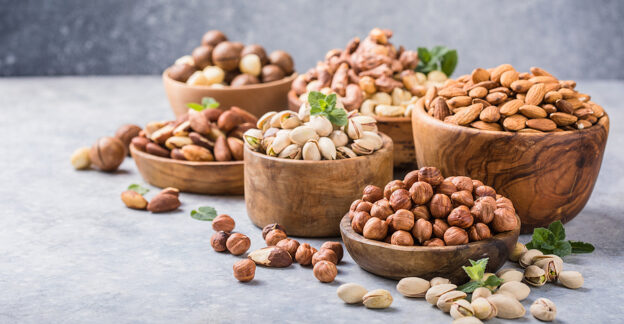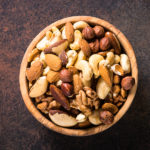By David Blyweiss, M.D., Advanced Natural Wellness
February 25, 2022
I love nuts. Sometimes I’ll buy them mixed, other times I’ll just grab a bag of one type or another. That works out well for me, because I don’t have a favorite. I like all of them.
What I’ve found is that when I get different nuts to put in my salad each night, I can rotate them. One night I’ll toss in some almond slivers. Another night it’s walnuts or pecans. Sometimes I even get a little crazy and use candied walnuts and candied pecans…and well, I really like the occasional crunchiness on my fork.
One of the things I like best about nuts is that they’re so darned good for you.
Tree nuts, in particular, are a great source of protein of protein and healthy fats. They’re loaded with vitamins, minerals, antioxidants and other compounds that fuel your body and protect against disease.
This means tree nuts can have a profound effect on your gut microbiota, endothelial function, blood pressure, and inflammation markers. These are four important factors in maintaining a healthy cardiovascular system and protecting against heart disease.
They also protect against the development of type 2 diabetes and help control blood sugar. They’re great for fighting off dementia and Alzheimer’s. They battle cancer. And, despite the fact that many people believe they are fattening, they actually help people lose weight.
Still, less than 40% of Americans eat nuts on a regular basis. Instead, you should be eating them every day.
5 Nuts to Eat for Better Health
MD Exposes the Hidden Danger to Your Eyes

When your eyesight starts to fail, it's a real problem. Suddenly you can't go to the grocery store... you can't get to the doctor if you have an emergency... you can't meet your friends for dinner…
Your "regular" doctor doesn't have time to keep up with the latest research. And the same goes for eye doctors. They go to school to learn how to fit you for glasses and contacts, but have no way of preventing the damage and loss of eyesight that threatens your freedom and independence.
Let me show you something that explains a LOT about how your eyes work.
In my FREE Special Report, I'll show you a HUGE, untapped resource for your eyes that safely and naturally restores clear, effortless eyesight.
Click here to get started...
All nuts are great for you. But they do have different nutrient profiles, so some may have a little something extra that another nut doesn’t. So let’s take a look at five classic nuts that everyone should be eating regularly – at least a hand full of one or another each day.
Walnuts. One of the things I like about walnuts is the positive effect they have on your gut microbiota. Just 42 grams (a bit more than an ounce) of walnuts daily can increase the abundance of gut bacteria that have anti-inflammatory and probiotic activities.
They also enhance bacterial populations that produce a short-chain fatty acid (SCFA) called butyrate. This SCFA helps increase blood flow in your colon and also appears to reduce the risk of colon cancer by blunting the spread of cancer cells and stimulating their death.
What’s more, butyrate reduces pH levels, harmful metabolites and enzyme activities that are harmful to the healthy microbiota in your gut. There is even evidence that it can reduce IBS symptoms.
Almonds are another nut that can have a positive influence on the composition of your gut microbiota. In particular, the natural skin that appears on almonds has prebiotic activities that fuel the beneficial bacteria in your gut.
But that’s not all a handful of almonds will do for you. Additionally they decrease several inflammatory markers, such as IL-6 and CRP, which are associated with type 2 diabetes and heart disease. Just 56 grams(less than two ounces) daily for four weeks can slash these markers by more than 10%.
Brazil nuts. A single Brazil nut contains between 68 and 91 mcg of selenium. Selenium is a marvelous mineral for energy, increased metabolism, weight loss, a healthy prostate and warding off infections. Selenium from Brazil nuts can also help improve cognitive performance in adults with mild cognitive impairment.
And here’s something else about Brazil nuts. When people ate a total of just four Brazil nuts, it improved their LDL/HDL ratio for a total of 30 days. That’s right – just four nuts lowered LDL and increased HDL for a full month.
Pistachios are high in lutein, beta-carotene and gamma-tocopherol relative to other nuts. Eating more of these nuts can significantly decrease oxidized-LDL concentrations. When LDL particles become oxidized it makes them extremely inflammatory. (You can check this out to find out more about the dangers of oxidized LDL.)
Like other tree nuts, pistachios also help enhance the composition of your gut bacteria. Plus they improve blood pressure and endothelial function, decrease fasting blood sugar and enhance insulin metabolism.
Pecans. While all nuts can have a positive effect on your cardiovascular system and LDL particle size, one thing I like about pecans is that they have been shown to decrease levels of apolipoprotein B (apoB) by about 11%.
This is an atherogenic substance that attaches itself to the surface of small, dense LDL particles. These particles slip easily into your arterial walls, and apoB is the substance that promotes the plaque build-up associated with them.
Are You Suffering From...
- Love handles and a pot belly
- Romance that isn't what it used to
- Forgetfulness and inattention
- Low (or no) strength and endurance
- A sex drive that's shifted into neutral...or worse
If so...you may have Mature Male Burnout. Click here to discover more about this unique condition and what you can do about it.
You can easily see why it’s so hard to choose one nut over another!
There are all kinds of different ways to eat them. You just munch on nuts. You can add them to your yogurt. You can chop them up to coat your fish.
However, there is one nut you should never eat.
The One Nut You Should Never Eat
However, there’s one nut you should avoid at all costs.
It’s called the peanut.
Believe it or not, this food isn’t even a nut. It’s a legume. And these crunchy treats are one of the top allergens in the world today. Peanuts also contain proteins that are resistant to digestion and are considered toxic.
Even worse, peanuts contain aflatoxin, a natural toxin produced by certain strains of mold. Aflatoxin is a carcinogen that’s been shown to cause cancer in rats.
Instead, choose Brazil nuts, walnuts, pecans, pistachios and other tree nuts. Buy organic, unsalted brands… and enjoy a life that’s all the healthier for it.
SOURCES:
Creedon AC, Hung ES, Berry SE, Whelan K. Nuts and their Effect on Gut Microbiota, Gut Function and Symptoms in Adults: A Systematic Review and Meta-Analysis of Randomised Controlled Trials. Nutrients. 2020;12(8):2347.
Guasch-Ferré M, Liu X, Malik VS, et al. Nut Consumption and Risk of Cardiovascular Disease. J Am Coll Cardiol. 2017;70(20):2519-2532.
Chauhan A, Chauhan V. Beneficial Effects of Walnuts on Cognition and Brain Health. Nutrients. 2020;12(2):550
Jaceldo-Siegl K, Haddad E, Oda K, Fraser GE, Sabaté J. Tree nuts are inversely associated with metabolic syndrome and obesity: the Adventist health study-2. PLoS One. 2014;9(1):e85133.
Guetterman HM, Swanson KS, Novotny JA, Baer DJ, Holscher, HD. Walnut Consumption Influences the Human Gut Microbiome. FASEB Jnl. 2016;(30) No. 1_supplement
Holscher HD, Guetterman HM, Swanson KS, An R, Matthan NR, Lichtenstein AH, Novotny JA, Baer DJ. Walnut Consumption Alters the Gastrointestinal Microbiota, Microbially Derived Secondary Bile Acids, and Health Markers in Healthy Adults: A Randomized Controlled Trial. J Nutr. 2018 Jun 1;148(6):861-867.
Załęski A, Banaszkiewicz A, Walkowiak J. Butyric acid in irritable bowel syndrome. Prz Gastroenterol. 2013;8(6):350-353.
Liu Z, Lin X, Huang G, Zhang W, Rao P, Ni L. Prebiotic effects of almonds and almond skins on intestinal microbiota in healthy adult humans. Anaerobe. 2014 Apr;26:1-6.
Liu JF, Liu YH, Chen CM, Chang WH, Chen CY. The effect of almonds on inflammation and oxidative stress in Chinese patients with type 2 diabetes mellitus: a randomized crossover controlled feeding trial. Eur J Nutr. 2013 Apr;52(3):927-35.
Colpo E, Dalton D A Vilanova C, Reetz LG, Duarte MM, Farias IL, Meinerz DF, Mariano DO, Vendrusculo RG, Boligon AA, Dalla Corte CL, Wagner R, Athayde ML, da Rocha JB. Brazilian nut consumption by healthy volunteers improves inflammatory parameters. Nutrition. 2014 Apr;30(4):459-65.
Rita Cardoso B, Apolinário D, da Silva Bandeira V, Busse AL, Magaldi RM, Jacob-Filho W, Cozzolino SM. Effects of Brazil nut consumption on selenium status and cognitive performance in older adults with mild cognitive impairment: a randomized controlled pilot trial. Eur J Nutr. 2016 Feb;55(1):107-16.
Colpo E, Vilanova CD, Brenner Reetz LG, Medeiros Frescura Duarte MM, Farias IL, Irineu Muller E, Muller AL, Moraes Flores EM, Wagner R, da Rocha JB. A single consumption of high amounts of the Brazil nuts improves lipid profile of healthy volunteers. J Nutr Metab. 2013;2013:653185.
Kay CD, Gebauer SK, West SG, Kris-Etherton PM. Pistachios increase serum antioxidants and lower serum oxidized-LDL in hypercholesterolemic adults. J Nutr. 2010 Jun;140(6):1093-8.
Hernández-Alonso P, Bulló M, Salas-Salvadó J. Pistachios for Health: What Do We Know About This Multifaceted Nut? Nutr Today. 2016 May;51(3):133-138.







